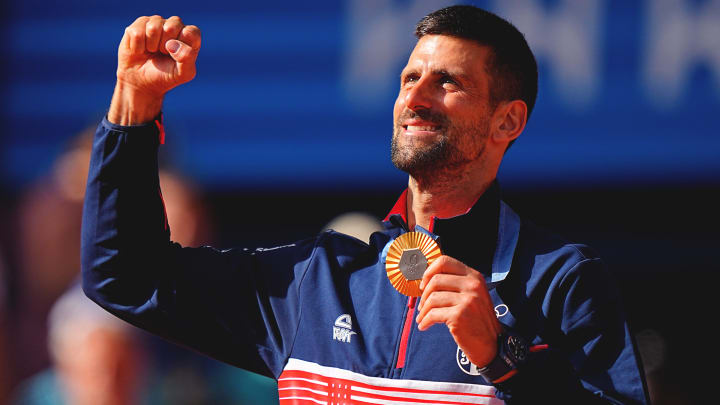With Golden Slam, Novak Djokovic Makes His Case for World's Greatest Living Athlete

It may as well have started on papyrus; it's now playing out on streaming services. But the legend of Novak Djokovic continues to grow. This afternoon in Paris—age 37, weeks from knee surgery, weeks from losing the Wimbledon final, pitted against tennis's new dynamo—the Serb fulfilled his long, self avowed goal of winning Olympic singles gold. In the best match he has played this year, and in the first title he has won this year, Djokovic defeated Carlos Alcaraz of Spain, 7–6, 7–6 in a two-hour-and-52-minute classic.
The GOAT debate has long been settled with 24 majors. Djokovic has declared game-set-match on that competition, but now he has entered an entirely new pasture: Is this the greatest living athlete? With today's triumph, he has now won every major event at least three times. He has won every Masters 1000 title. He has now won Olympic gold. He's done it all by elevating his tennis when the stakes matter most—the abiding theme of his unrivaled career.
Today's match was in part about tennis. Three Sundays ago, these same two opponents met at Wimbledon and Alcaraz got the better of his opponent 15 years his senior. He moved better, he defended better, he served better. He won in straight sets. In 21 days, Djokovic completely flipped the script. On the clay of Roland Garros where he has won the title three times (though Alcaraz won the title earlier this summer), Djokovic served nearly flawlessly, unbroken in 24 service games. He rendered Alcaraz a non-combatant, using depth to keep the Spaniard at bay and neutralize his power. Djokovic also showed few effects of the knee injury that has jeopardized his summer.
But beyond the X's and O's, this was really constitutional. Djokovic has made no secret of his motivation to win gold. As he put it to me several months ago: "It has been [a gap on the résumé] for a very long time. ... The Olympic Games are the oldest ever sports event in the history of sport. And it's probably the most watched sports event in the world."
Here in Paris, he played like this was the quest all along. He did not lose one set in the six matches he played, and was something verging on flawless today. He will be remembered for the numbers and the way he pads his Wikipedia page with records. But beyond that, he will be known for his constitution. Has any other athlete had more of a supernatural talent for meeting the moment?
Spare thought for Alcaraz, he's clearly tennis's new star. At 21 years old, he was trying to become only the third player in tennis history to win the French Open, Wimbledon and Olympic gold. He came within a few points of doing so. But this defeat will sting. It will recall last summer, when Djokovic beat him in Cincinnati weeks after the Wimbledon tournament. Silver medal is, of course, a great feat, but Alcaraz came to win gold, and he was thwarted by his new rival, who also now leads him four to three in head-to-head matches.
As for Djokovic, what's next? The American hardcourt, including the U.S. Open where he is defending champion. At age 37, he has to be susceptible to time at some point. But we are not there yet. Today will go down as one of the great feats of his career, which, of course, is saying something. He wore a permanent smile as he accepted his gold medal in late afternoon in Paris. It was hard not to notice there was still plenty of light in the sky.
